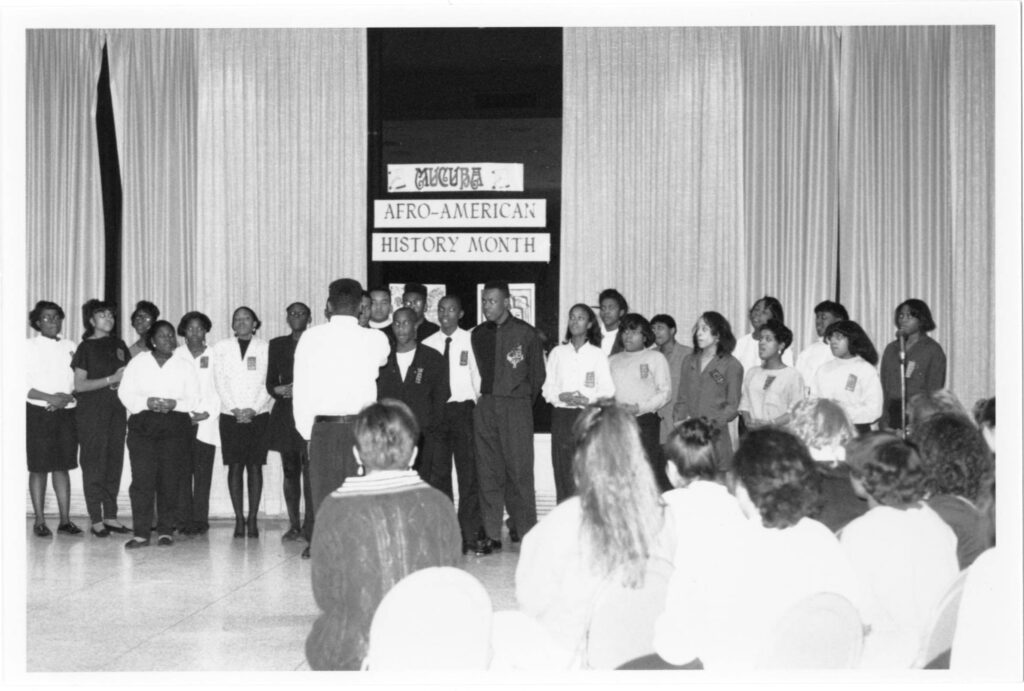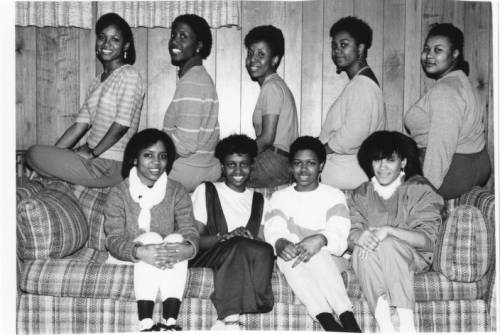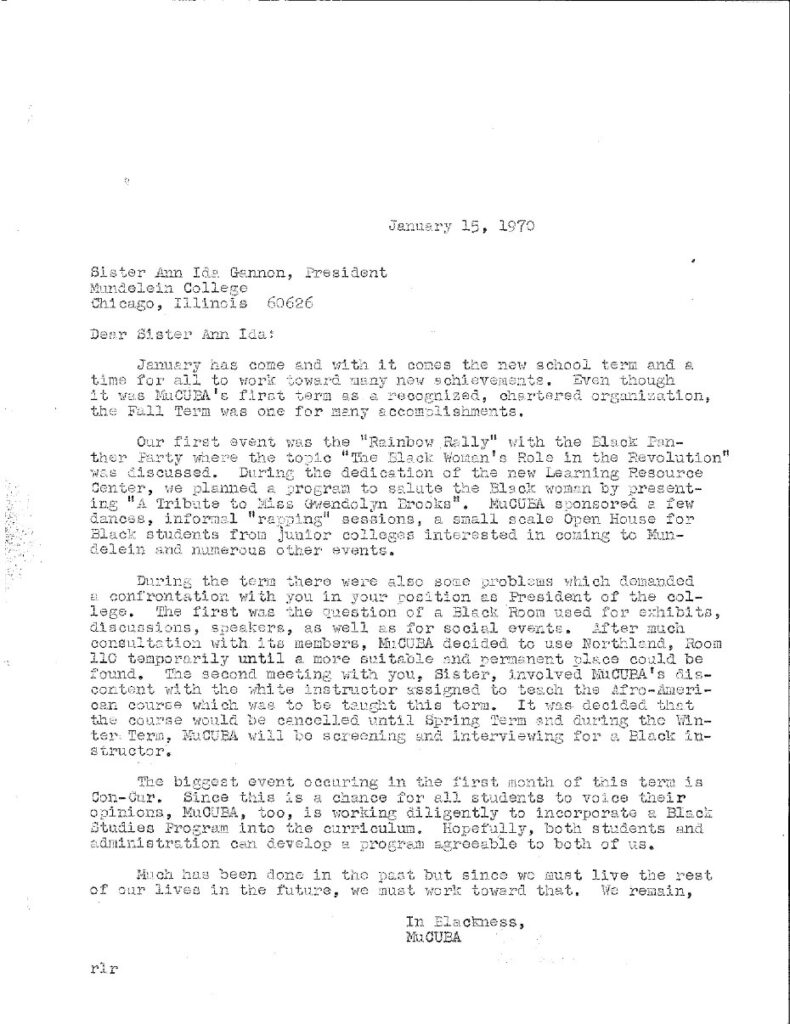This post was updated with new research and republished in April 2023. It was originally published in January 2023.
The 1960s were a tumultuous time for college students. The decade saw a surge of activism led by students across the United States. Between the war in Vietnam and the growth of the Civil Rights Movement, it is difficult to find a college student who did not take part in one activist cause or another. Mundelein College was not exempt from this student activism. The campus saw huge demonstrations against the war. The October Moratorium of 1969 saw 85% of Mundelein’s campus participate in anti-war activities [1]. When reviewing the Women and Leadership Archives’ collection of this period, especially the Mundelein Voices Media Portal, it is difficult to ignore the prevalence of anti-war involvement on campus. However, finding evidence of the activism of Black students at Mundelein can be more difficult.

The 1960s were brimming with national Black student activism. Organizations like the Student Nonviolent Coordinating Committee (SNCC), Congress of Racial Equality (CORE), Southern Christian Leadership Conference (SCLC), and the Black Panther Party helped to shape a growing Black student movement, which reached its zenith during the decade [2]. By 1968, many universities had Black student organizations. By the beginning of the ’70s, many of these organizations were using their power to make themselves heard. Universities such as the University of Kansas and the University of Wisconsin at Madison were rocked by strikes led by their respective Black student unions [3]. Mundelein was not immune to the wave of Black empowerment that led to vocal activism. In the fall semester of 1969 Black students at Mundelein formed a group to work collectively for their goals.

The Mundelein College United Black Association (MuCUBA) organized to make Mundelein a more accepting place for Black students. They also vocally challenged the institutional racism that plagues many predominantly white colleges and institutions. A May 22, 1970, newsletter, described that MuCUBA was “not just a club, it is a life-style–a home away from home. We are not just black students going to Mundelein College, we are a black community” [4]. MuCUBA reflected on their early campus activity in a 1970 letter to Mundelein President Sister Ann Ida Gannon:
“Our first event was the “Rainbow Rally’ with the Black Panther Party where the topic “The Black Woman’s Role in the Revolution” was discussed. During the dedication of the new Learning Resource Center, we planned a program to salute the Black woman by presenting “A Tribute to Miss Gwendolyn Brooks”” [5]
On May 15, 1970, MuCUBA submitted a list of demands to the Mundelein community. Among the demands, Black students insisted on the creation of a Black Studies program, better conditions for Black student workers, and funding from the college for a Black student center. MuCUBA also demanded that Mundelein admit more Black students and combat racism on campus by requiring the “administration rid the college of prejudiced instructors and administrators” [6]. Other Black student organizers from around the country made similar requests. Students at University of Wisconsin Madison also called for a Black Studies department, higher admission of Black students, and development of a Black Cultural Center (which is still in operation on their campus as of 2022) [7].
MuCUBA also made it clear that Black women on campus demanded a space for their community. They insisted on a “Black Room” for hosting speakers, discussions, and exhibits. While waiting for a response from the Mundelein administration, MuCUBA occupied Northland Hall room 110. In response to these demands, Mundelein turned the faculty dining room into a dedicated dining room for Black students and created a Black student union in Piper Hall. These spaces were only available to Black students, white students were not allowed to enter these cultural spaces [8].
The national demand for colleges and universities to embrace the Black community and fight the institutional racism led to many changes on campuses across the country. One such change was the creation of dedicated spaces for Black students. Additionally, Sister Ann Ida Gannon agreed to meet with MuCUBA students in hopes “that Mundelein — as an institution as well as individually – will go beyond your Demands to an even wider and more lasting response” [9] A steering committee was formed to address these demands and released a “Report on the State of Black Studies at Mundelein” in May 1971. Many of the demands resulted in change to Mundelein, including a Black studies program, seminars on institutional racism, and the creation of a Black Scholarship Fund [10].
Figure 5. Flyer for MuCUBA’s annual “Young, Gifted, and Black” Dinner and Fashion Show, 1975.
The Mundelein College United Black Association did not end after the college met their demands; they continued their work to empower Black students until Mundelein College affiliated with Loyola University Chicago in 1991. MuCUBA was incredibly active in providing spaces for Black students to celebrate their identities. One of their major events was the annual “Young, Gifted, and Black” spring fashion show and dinner dedicated to Black seniors. MuCUBA was also instrumental in celebrating Black History Month at Mundelein with a month of programming. This included a soul food dinner, various speakers, NAACP sign-ups, cultural celebrations, and Martin Luther King Jr. Celebrations. In 1986 the Black History Month celebration included a visit from Harold Washington, then mayor of Chicago, the first person of color to hold that position. In 1987, MuCUBA awarded Washington with the Black Leadership Award [11].


In the twenty-two years of its existence, MuCUBA and the students who ran it, made fundamental changes in the way Mundelein College interacted with its Black student community. In addition to these institutional changes, MuCUBA continued their work of making Black students seen and felt on campus, taking the space they deserved, and celebrating the heritage and history they shared. What began as a student group demanding change in the 1960s and 1970s became a cornerstone of Black student life at Mundelein and the surrounding area. The last decade has seen many archivists attempting to right this wrong and uncover the silenced stories of people of color. Initiatives like the Public History Project at the University of Wisconsin—Madison and the Blue, Gold, and Black Digital Archive at the University of Pittsburgh are dedicated to telling the history of Black students at predominantly white institutions. This is an ongoing process and still has a long way to go. It is important to recognize and remember the role these student activists played in fighting racism at Mundelein College.

Sources
[1] “Moratorium, 1969 · Activist Mundelein: Civic Engagement at a 20th Century Women’s College · Loyola University Chicago Digital Special Collections.” Accessed November 30, 2022. http://www.lib.luc.edu/specialcollections/exhibits/show/activist-mundelein–student-en/-antiwar-protest-/moratorium–1969.
[2] Ahmad, Muhammad. “On the Black Student Movement-1960-70.” The Black Scholar 9, no. 8–9 (1978): 2–11. https://doi.org/10.1080/00064246.1978.11414012.
[3] “1969 Black Student Strike | UW–Madison.” Accessed November 30, 2022. https://news.wisc.edu/black-student-strike/story/., “Black Student Activism and BSU · 1970: The Year That Rocked KU · KU Libraries Exhibits.” Accessed November 30, 2022. https://exhibits.lib.ku.edu/exhibits/show/the-year-that-rocked-ku/black-student-activism.
[4] “A New Black Consciousness · Activist Mundelein: Civic Engagement at a 20th Century Women’s College · Loyola University Chicago Digital Special Collections.” Accessed November 30, 2022. http://www.lib.luc.edu/specialcollections/exhibits/show/activist-mundelein–student-en/-we-started-in–68-/-diane-allen-.
[5] January 15, 1970, letter to Sister Ann Ida Gannon
[6] “Demands” Folder F.8.13.a. Mundelein College Collection, Women and Leadership Archives.
[7] “1969 Black Student Strike | UW–Madison.” Accessed November 30, 2022. https://news.wisc.edu/black-student-strike/story/.
[8] Gallagher, Blanche Marie, B.V.M., “Life Flows through the Dream,” in Mundelein Voices: The Women’s College Experience (1930-1991), edited by Ann M. Harrington, B.V.M. and Prudence Moylan (Chicago: Loyola Press, 2001), 86-87.
[9] May 16, 1970, Letter to the Black Students of Mundelein, Mundelein College Records.
[10] “Report on the State of Black Studies at Mundelein,” Mundelein College Records.
[11] United Black Association (MuCUBA), Mundelein College Record 304-3.

Chris is a graduate assistant at the WLA and is in their second year in the Public History MA program at Loyola. Chris’ focus is on Queer history in America and Germany in the pre-Stonewall era. Chris is currently a graduate assistant at the Leather Archives and Museum in Chicago, IL. In their free time, Chris is a baker, drag queen, and dog parent.
Loyola University Chicago’s Women and Leadership Archives Blog is designed to provide a positive environment for the Loyola community to discuss important issues and ideas. Differences of opinion are encouraged. We invite comments in response to posts and ask that you write in a civil and respectful manner. All comments will be screened for tone and content and must include the first and last name of the author and a valid email address. The appearance of comments on the blog does not imply the University’s endorsement or acceptance of views expressed. Questions? Please contact the WLA at wlarchives@LUC.edu.
[1] “Moratorium, 1969 · Activist Mundelein: Civic Engagement at a 20th Century Women’s College · Loyola University Chicago Digital Special Collections.” Accessed November 30, 2022. http://www.lib.luc.edu/specialcollections/exhibits/show/activist-mundelein–student-en/-antiwar-protest-/moratorium–1969.
[2] Ahmad, Muhammad. “On the Black Student Movement-1960-70.” The Black Scholar 9, no. 8–9 (1978): 2–11. https://doi.org/10.1080/00064246.1978.11414012.
[3] “1969 Black Student Strike | UW–Madison.” Accessed November 30, 2022. https://news.wisc.edu/black-student-strike/story/., “Black Student Activism and BSU · 1970: The Year That Rocked KU · KU Libraries Exhibits.” Accessed November 30, 2022. https://exhibits.lib.ku.edu/exhibits/show/the-year-that-rocked-ku/black-student-activism.
[4] “A New Black Consciousness · Activist Mundelein: Civic Engagement at a 20th Century Women’s College · Loyola University Chicago Digital Special Collections.” Accessed November 30, 2022. http://www.lib.luc.edu/specialcollections/exhibits/show/activist-mundelein–student-en/-we-started-in–68-/-diane-allen-.
[5] January 15, 1970, letter to Sister Ann Ida Gannon. Mundelein College Records.
[6] “Demands” Folder F.8.13.a. Mundelein College Collection. Women and Leadership Archives.
[7] “1969 Black Student Strike | UW–Madison.” Accessed November 30, 2022. https://news.wisc.edu/black-student-strike/story/.
[8] May 16, 1970, Letter to the Black Students of Mundelein. Mundelein College Records.
[9] “Report on the State of Black Studies at Mundelein” Mundelein College Records.




